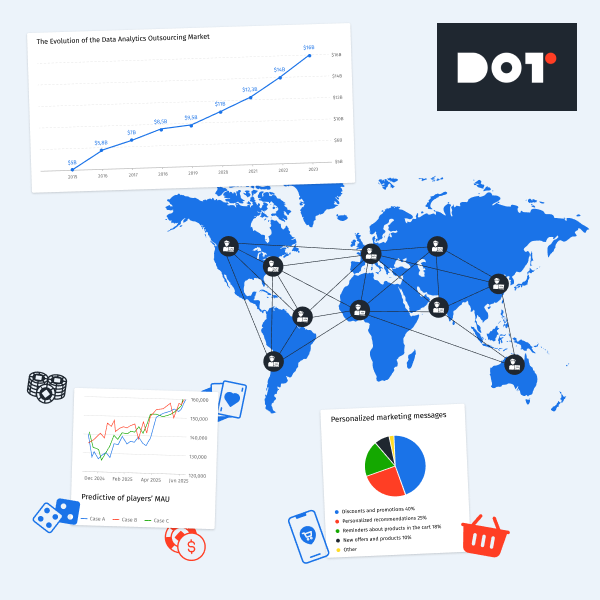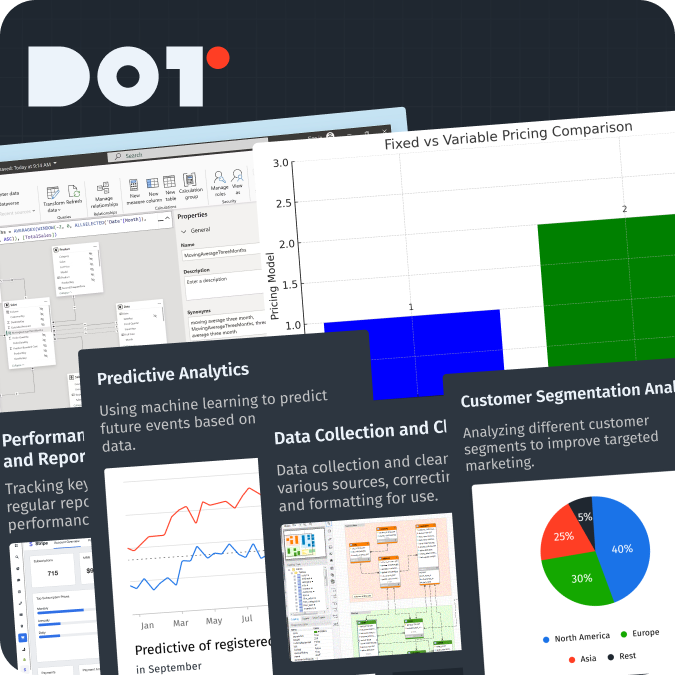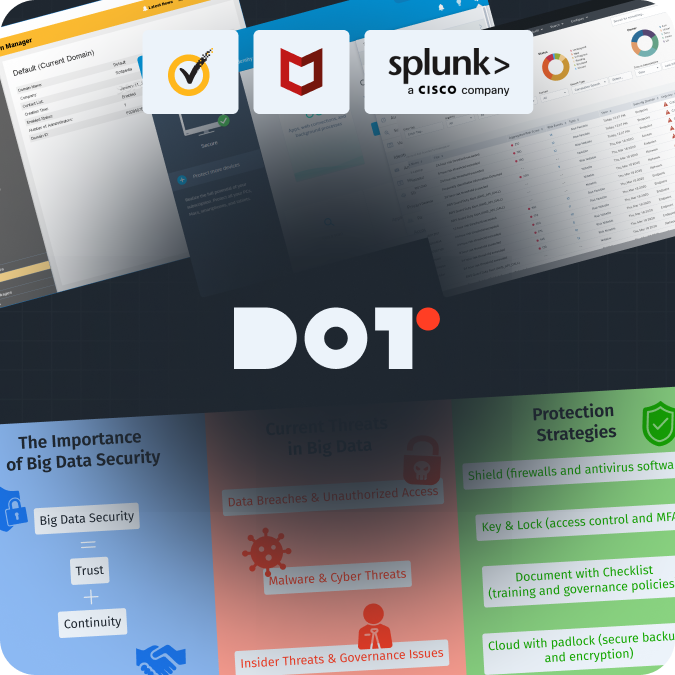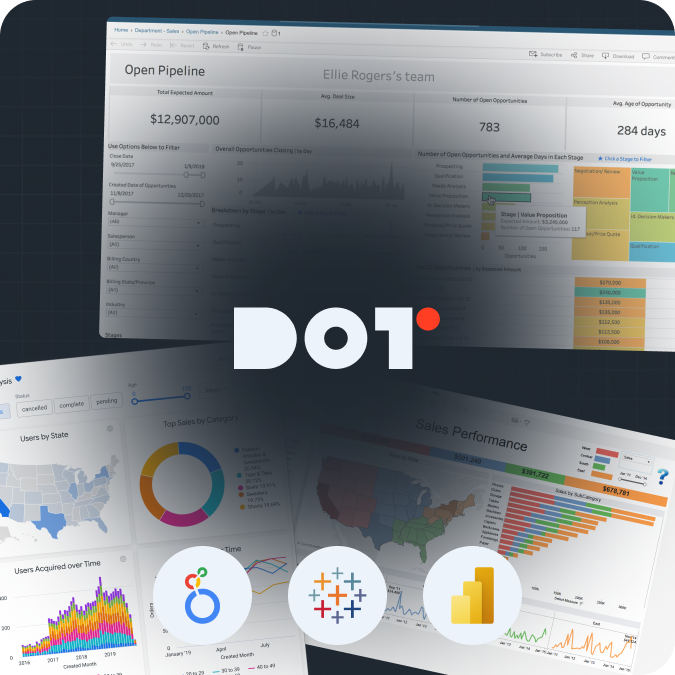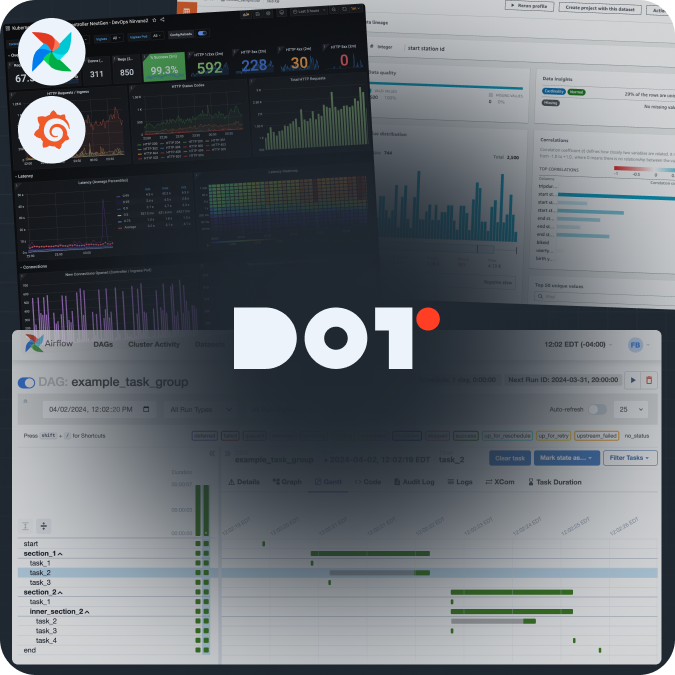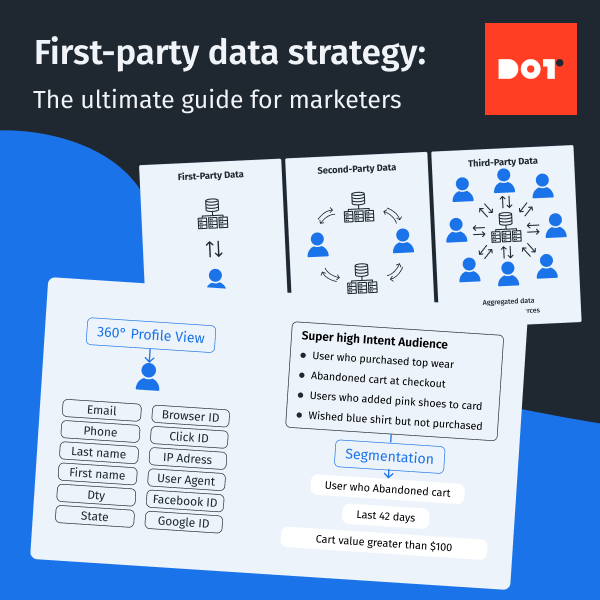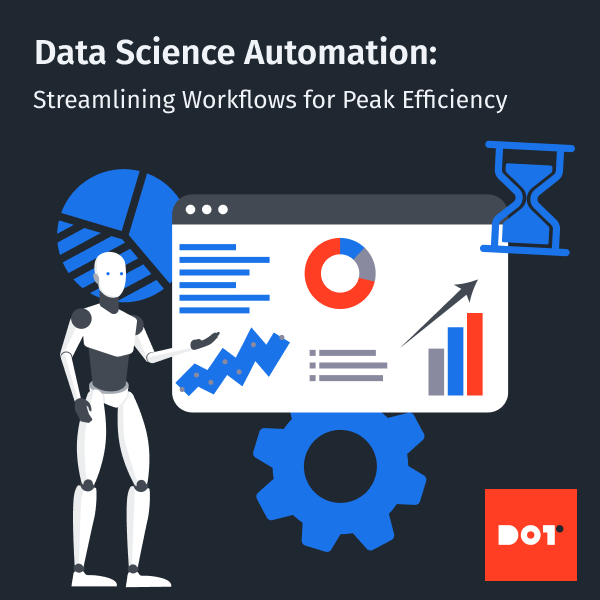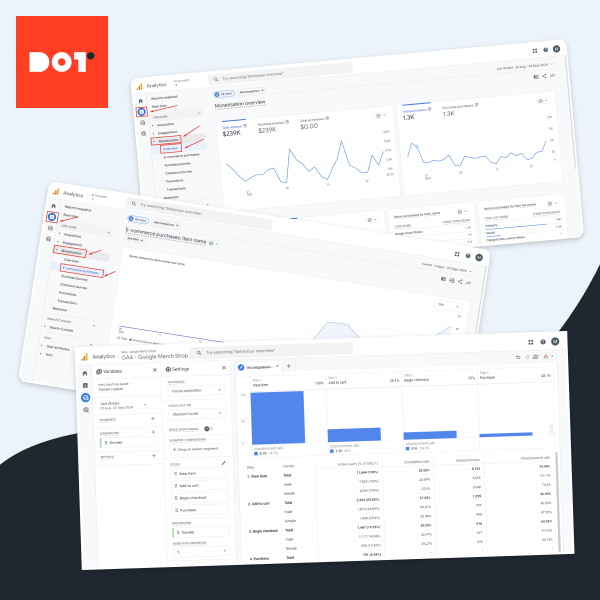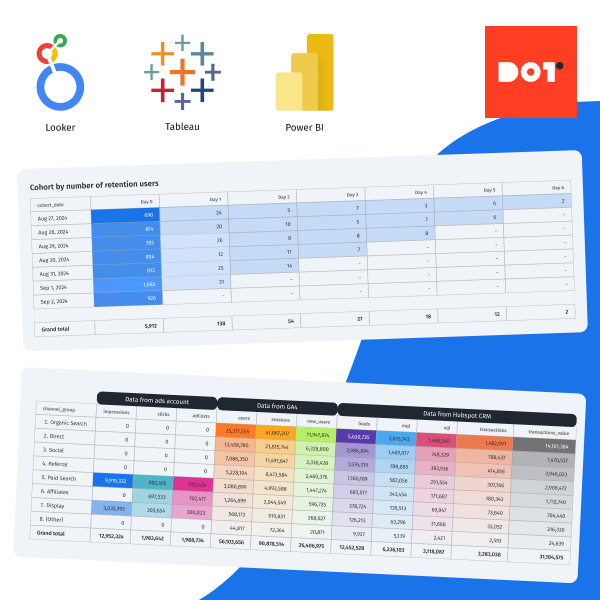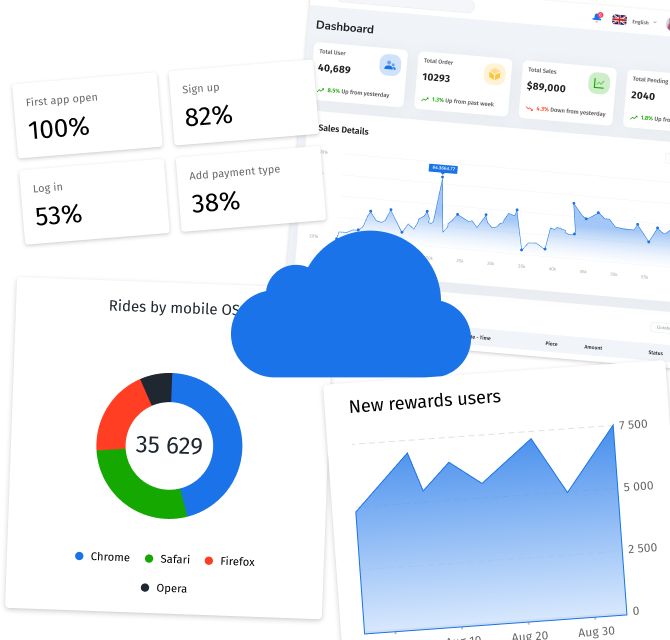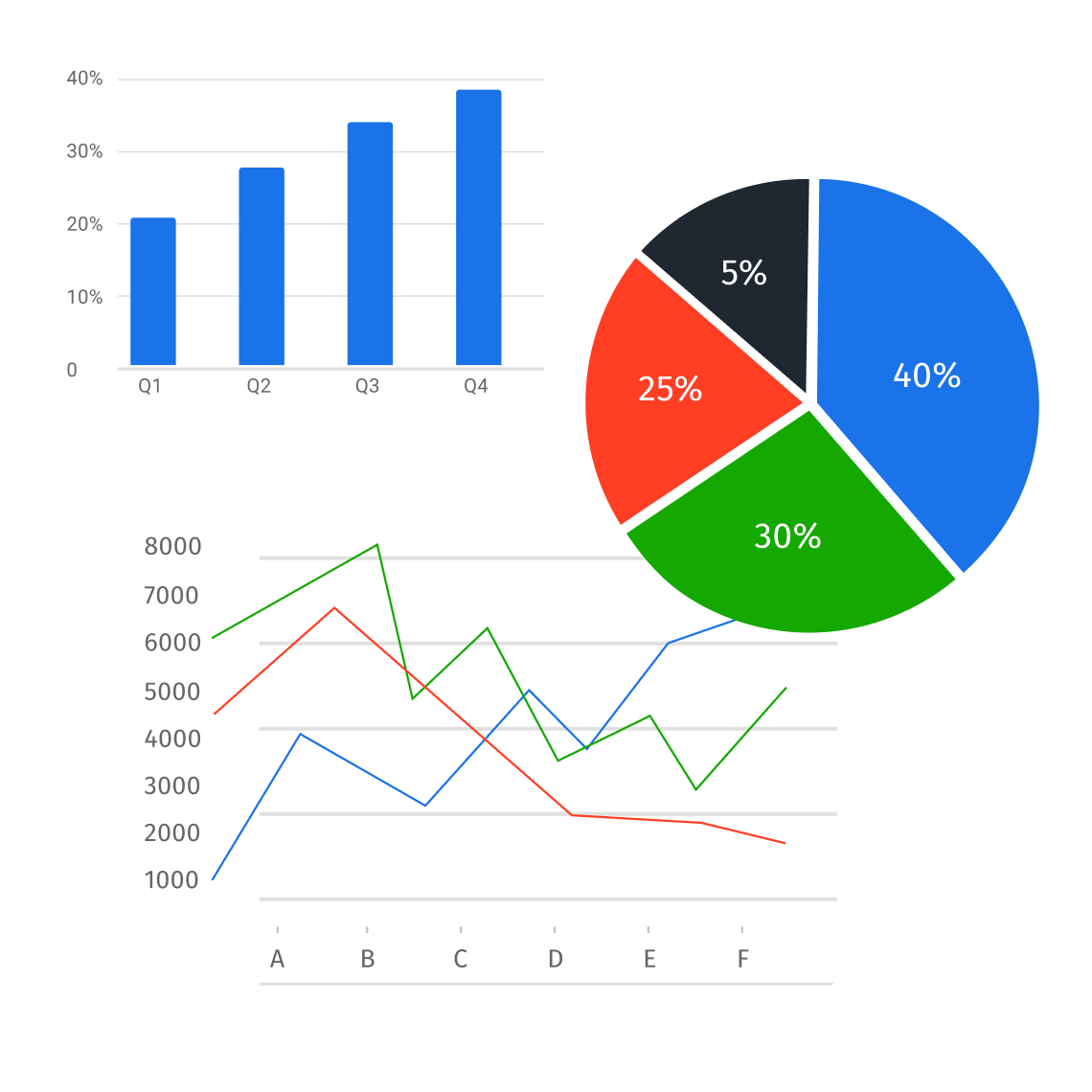Overview of Data Science Outsourcing
Data science outsourcing offers businesses that collect vast amounts of data—from customer interactions to operational processes—a smart, practical solution. Making sense of this data to find useful insights requires specialized skills and tools. By outsourcing data science, companies can access expert help without needing to hire or build their own in-house team.
Data science outsourcing means working with outside experts or agencies to handle things like analyzing data, building predictive models, or using machine learning. Instead of hiring and training your own data scientists, you can partner with professionals who already have the skills and tools needed. Since 2019, Dot Analytics has been offering data science outsourcing services, helping businesses turn their data into useful information.
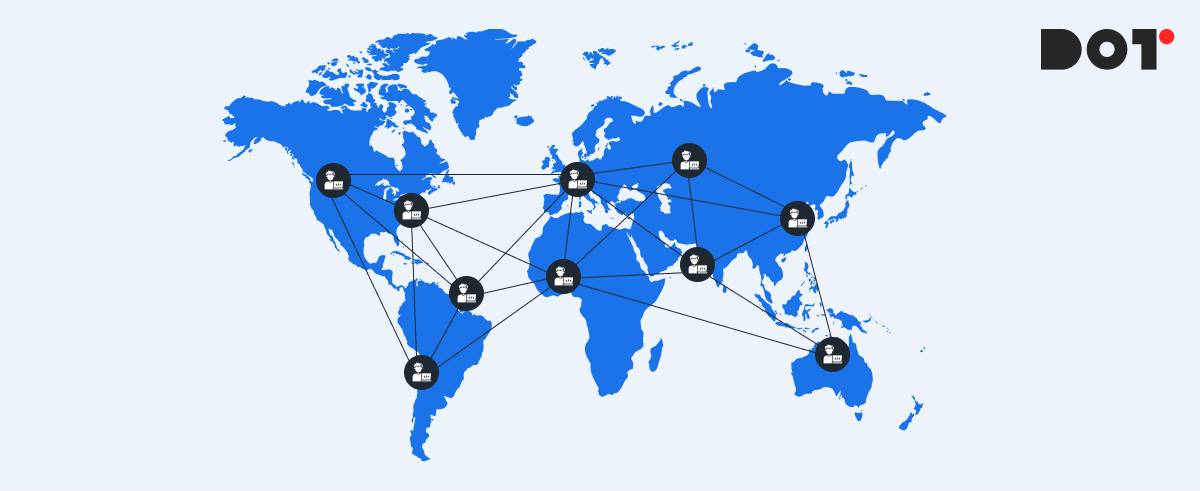
Right now, we’re working on an exciting project that predicts Return on Marketing Investment (ROMI) from any type of ad traffic—whether it’s from large platforms like Google or independent media publishers. This helps businesses understand how well their marketing dollars are being spent across a variety of sources.
Outsourcing data science offers several important benefits, including:
- Cost savings: You avoid the high costs of building an internal team and buying expensive tools.
- Access to top experts: You can work with data specialists who already have the right skills and knowledge.
- Faster insights: External experts can quickly analyze your data and provide valuable recommendations.
- Quick project start: You don’t need to wait to set up a big team. With outsourcing, the project can start right away.
By outsourcing data science, companies can focus on what they do best while still using data to drive their success. It’s a simple, effective way to stay competitive in today’s data-driven world.
Understanding Data Science Outsourcing
Definition and Scope
Data science outsourcing is when businesses partner with external experts or agencies to handle data-related tasks. These tasks can range from basic data processing to advanced projects like building predictive models, machine learning algorithms, and data visualizations.
The scope of data science outsourcing typically covers:
- Analyzing large datasets to uncover trends and insights
- Developing predictive models to forecast outcomes like customer behavior or sales trends
- Clustering and segmenting data for more informed decision-making
- Personalizing marketing strategies based on data insights
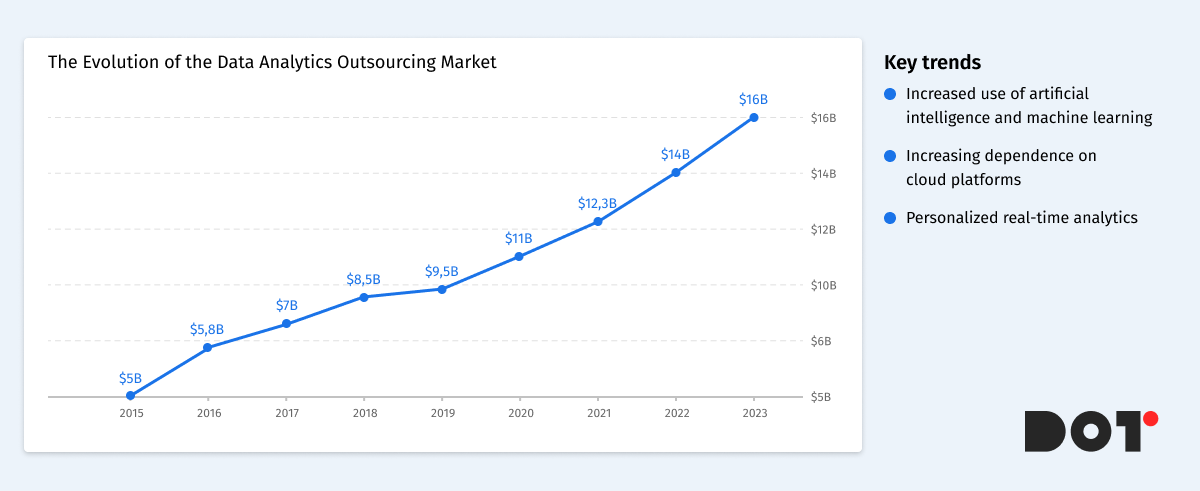
At Dot Analytics, we have specialized in handling big data projects in the marketing and product-related fields over the past few years. Our focus has been on predictive models, clustering, customer segmentation, and personalized marketing strategies. These types of projects help businesses improve their marketing effectiveness and optimize product offerings by leveraging real-time, data-driven insights.
Evolution and Market Trends
The data analytics outsourcing market has seen rapid growth over the past decade. Initially, only large companies with extensive resources could build in-house data science teams, but now companies of all sizes can take advantage of external data expertise through outsourcing. The increasing volume and complexity of data have made data science outsourcing a practical, cost-effective solution for many organizations.
Key trends in the data analytics outsourcing market include:
- Greater use of artificial intelligence and machine learning in outsourced projects, helping businesses automate processes and extract faster insights from data.
- A growing reliance on cloud-based platforms for scalable and efficient data storage and analysis.
- A focus on personalized and real-time analytics, enabling businesses to respond quickly to market shifts and customer demands.
By tapping into the data analytics outsourcing market, businesses can access cutting-edge technologies and talent without the overhead of maintaining an internal team. This allows them to stay competitive, agile, and data-driven in an increasingly fast-paced business environment.
Key Benefits of Data Science Outsourcing
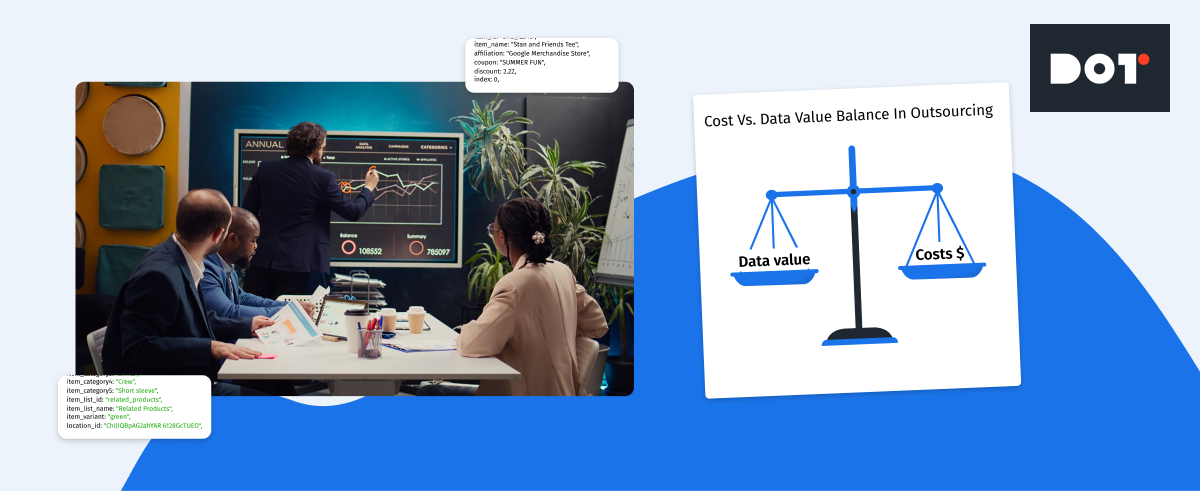
Access to Specialized Expertise
One of the main advantages of data science and data analytics outsourcing is gaining access to skilled professionals with specialized knowledge. These experts have experience in various industries and can handle complex tasks that might be challenging for an in-house team.
For example, tasks like predictive analytics outsourcing allow businesses to forecast future trends based on data. At Dot Analytics, we’ve helped companies develop predictive models to anticipate customer behavior, optimize marketing campaigns, and improve product recommendations. By outsourcing these tasks, businesses can tap into expertise in areas like AI outsourcing and cloud data services without the long process of hiring and training new staff.
Cost-Effectiveness
Outsourcing data science can significantly reduce operational costs. Building an in-house team involves expenses like salaries, benefits, training, and investing in necessary tools and technologies. These costs can add up quickly, especially for small and medium-sized businesses.
In contrast, data analytics resource outsourcing allows companies to pay for only the services they need when they need them. There’s no need to invest in expensive software or infrastructure. For instance, hiring a full-time data scientist can be much more costly than outsourcing the same tasks to an external partner like Dot Analytics. This approach frees up budget resources for other critical areas of the business.
Scalability and Flexibility
Business needs can change rapidly, and data projects often require scaling up or down quickly. Outsourcing provides the flexibility to adjust the level of resources dedicated to a project as needed.
For example, if a company wants to expand its web data analytics outsourcing during a peak season, an outsourcing partner can easily allocate more experts to handle the increased workload. Conversely, during slower periods, services can be scaled back to reduce costs. This level of adaptability is hard to achieve with an in-house team, where staffing levels are more fixed.
Faster Time to Market
Outsourcing data science accelerates project completion and helps businesses get to market faster. External experts are already equipped with the necessary tools and experience to start working immediately.
Consider a company that wants to launch a new product and needs data insights to guide its strategy. Building an in-house team could take months of recruiting and training. By outsourcing to specialists like Dot Analytics, the project can start right away, reducing time to market and gaining a competitive edge.
Focus on Core Activities
By outsourcing tasks like business intelligence outsourcing, businesses can concentrate on their core activities. Managing complex data projects internally can divert attention and resources away from primary business functions.
For example, a retail company might prefer to focus on sales and customer service rather than data analysis. By partnering with an outsourcing provider, they can receive valuable insights without stretching their internal resources thin. This leads to improved overall efficiency and better business outcomes.
Access to Advanced Technologies
Outsourcing partners often have access to the latest tools and technologies in data analytics. They invest in cutting-edge software and platforms to deliver the best results for their clients.
Using advanced technologies like AI outsourcing and cloud data services can enhance data processing, analysis, and visualization. For instance, at Dot Analytics, we utilize state-of-the-art machine learning algorithms and big data platforms to handle complex datasets. Businesses benefit from these technologies without having to invest in them directly.
Ensuring Compliance and Security
Data compliance and security are critical concerns in today’s business environment. Outsourcing partners are well-versed in industry standards and regulations to ensure that data is handled properly.
They implement robust security measures to protect sensitive information. For example, compliance with standards like GDPR or HIPAA requires specialized knowledge. An experienced outsourcing provider can navigate these requirements, giving businesses peace of mind that their data is secure.
Fresh Perspectives and Innovation
Bringing in external experts can introduce new ideas and innovative approaches to solving problems. Outsourcing partners work with a variety of clients and industries, allowing them to apply best practices and creative solutions.
For example, an outsourcing team might suggest a novel way to segment customers or a new method for predicting market trends. This fresh perspective can lead to innovative solutions that an internal team might not have considered.
By leveraging data science and data analytics outsourcing, businesses can access specialized expertise, reduce costs, scale projects efficiently, and gain a competitive advantage. Partners like Dot Analytics offer the tools, knowledge, and flexibility needed to make the most of data in today’s dynamic market. Whether it’s predictive analytics outsourcing or utilizing cloud data services, outsourcing provides a pathway to enhanced performance and growth.
Challenges and Risks of Data Science Outsourcing
Potential Risks
While outsourcing data science offers numerous benefits, it’s important to be aware of potential challenges that may arise. Common risks include:
- Data Privacy and Security Concerns: Sharing sensitive data with an external partner can raise worries about confidentiality and the possibility of data breaches.
- Communication Issues: Differences in time zones, language barriers, or cultural misunderstandings can lead to miscommunication and project delays.
- Quality Assurance: Ensuring that the outsourced work meets your company’s standards and expectations can be challenging without proper oversight.
- Dependency on the Outsourcing Partner: Relying heavily on an external provider might make you vulnerable if the partner faces issues or if the partnership ends.
Mitigation Strategies
To address these challenges and ensure a successful outsourcing experience, consider the following strategies:
- Establish Strong Legal Agreements: Begin all projects with clear contracts and Non-Disclosure Agreements (NDAs) to protect your data and intellectual property. At Dot Analytics, we start every project with NDA terms, ensuring that your sensitive information remains confidential.
- Choose a Reputable Partner: Select an outsourcing provider with a solid track record and positive client testimonials. With six years of experience, Dot Analytics has built a reputation for reliability and data privacy. Many of our satisfied customers can attest to our commitment to trust and security.
- Implement Clear Communication Channels: Set up regular meetings and updates to keep everyone on the same page. Use collaborative tools and establish clear points of contact to minimize misunderstandings.
- Define Expectations Clearly: Outline project goals, timelines, deliverables, and quality standards from the outset. This ensures that both parties have a mutual understanding of what is expected.
- Ensure Compliance and Security Measures: Verify that your outsourcing partner follows industry-standard security protocols and complies with relevant regulations. Ask about their data handling practices and certifications.
- Start with a Pilot Project: Begin with a smaller project to assess the outsourcing partner’s capabilities before committing to larger, long-term engagements.
By being proactive and taking these steps, you can mitigate the risks associated with data science outsourcing. Partnering with a trusted provider like Dot Analytics allows you to focus on your core business activities, confident that your data projects are in capable and secure hands.
How to Choose the Right Data Science Outsourcing Partner
Selecting the right partner for data science outsourcing is crucial for the success of your projects. Here’s what to consider and a step-by-step guide to help you make the best choice.
Key Criteria
Expertise and Experience
Look for a partner with proven experience in data analytics outsourcing. They should have a solid track record in handling projects similar to yours. Whether you need web data analytics outsourcing to improve your online presence or machine learning outsourcing to develop predictive models, the partner should demonstrate expertise in these areas.
Technical Skills
Ensure the partner is proficient in the latest technologies and tools related to data science. This includes skills in data engineering outsourcing, where they manage and optimize your data pipelines, and offering comprehensive data consulting services to guide your strategies.
Industry Knowledge
A partner familiar with your industry can better understand your specific challenges and needs. This ensures they can provide solutions tailored to your business goals.
Communication and Collaboration
Effective communication is key to a successful partnership. The outsourcing partner should be responsive, transparent, and willing to work closely with your team. This helps prevent misunderstandings and keeps the project on track.
Reputation and References
Research the partner’s reputation. Look for client testimonials, case studies, or reviews. A company like Dot Analytics, with years of experience and positive feedback, can be a reliable choice.
Data Security and Compliance
Data privacy is critical. Ensure the partner has robust security measures in place to protect your sensitive information. They should comply with relevant regulations and be willing to sign confidentiality agreements.
Evaluation Process
1. Define Your Needs
Start by identifying what you want to achieve. Do you need web data analytics outsourcing to analyze website traffic and user behavior? Or perhaps machine learning outsourcing to create models that predict customer trends? Clearly defining your goals will help you find a partner that meets your specific needs.
2. Research Potential Partners
Create a list of potential partners specializing in data analytics outsourcing. Look for those offering the services you require, such as data consulting services or data engineering outsourcing.
3. Assess Expertise and Experience
Review the partners’ portfolios and case studies. Check if they have experience in your industry and have handled projects similar to yours. For example, if you need machine learning models, ensure they have successfully implemented such solutions before.
4. Evaluate Communication Skills
Arrange meetings to gauge their communication style. They should be able to explain complex concepts in simple terms and be open to your questions and feedback.
5. Check References and Reviews
Ask for references or look for reviews from previous clients. This can provide insights into their reliability, quality of work, and ability to meet deadlines.
6. Discuss Data Security Measures
Ensure the partner has strong data security practices. They should be transparent about how they protect data and comply with regulations. This is especially important when dealing with sensitive information.
7. Consider Cultural Fit
A good cultural fit can make collaboration smoother. Consider their work ethics, values, and approach to problem-solving to see if they align with your company’s culture.
8. Start with a Pilot Project
Before committing to a long-term partnership, consider starting with a small pilot project. This allows you to assess their performance and determine if they are the right fit.
By carefully evaluating potential partners based on these criteria, you can choose a data science outsourcing partner who will help your business thrive. Whether it’s through data consulting services, machine learning outsourcing, or data engineering outsourcing, the right partner can provide the expertise and support you need to make the most of your data.
Case Studies: Success Stories of Data Science Outsourcing
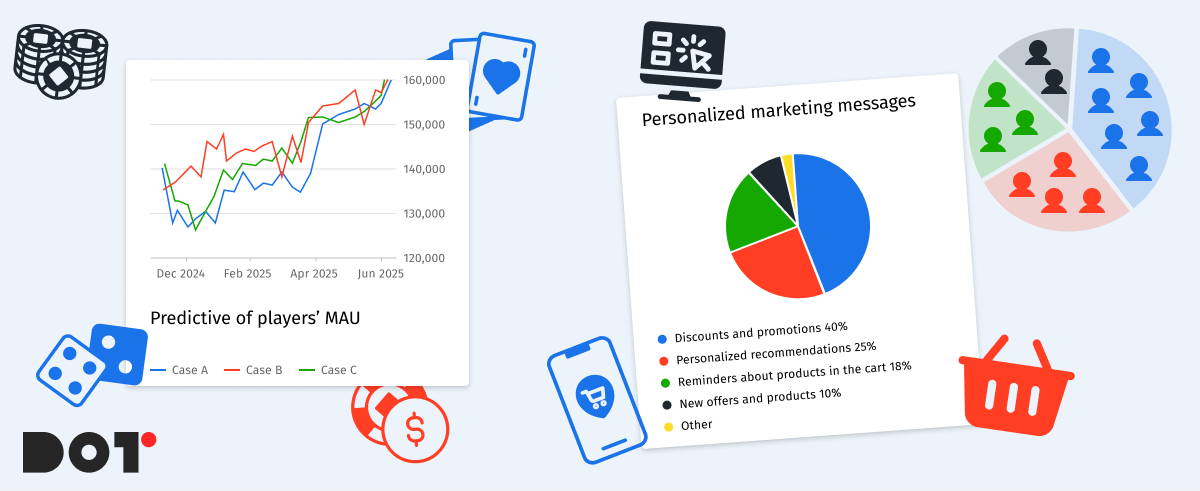
Predictive Model for ROMI in the iGaming Industry
An online gaming company aimed to optimize its marketing budget by predicting the Return on Marketing Investment (ROMI) across various advertising channels. They decided to outsource this project to Dot Analytics to leverage specialized expertise in predictive analytics.
Solution: Dot Analytics developed a predictive model using machine learning algorithms, including XGBoost and several other advanced models. These algorithms analyzed data from different ad sources, covering both major platforms and independent media publishers. By considering factors like user engagement, conversion rates, and historical performance, the models provided highly accurate forecasts of the expected ROMI for each advertising channel.
Result: With insights from the predictive models, the company was able to allocate its marketing budget more effectively. They increased spending on channels with higher predicted returns and reduced investment in less effective ones. This strategic reallocation led to a significant increase in overall ROMI, maximizing the impact of their marketing efforts without increasing the total budget.
Clustering for Personalized Marketing in E-Commerce
An e-commerce retailer faced challenges with customer retention and a high cart abandonment rate. To address this, they outsourced their data science project to Dot Analytics to gain deeper insights into customer behavior.
Solution: Dot Analytics performed clustering analysis on the retailer’s customer data. By grouping customers based on purchasing habits, browsing behavior, and preferences, they identified distinct segments within the customer base. This allowed the retailer to tailor personalized marketing campaigns for each segment.
Result: The personalized approach led to improved customer engagement. Customers received relevant product recommendations and offers, which increased their likelihood of completing purchases. The retailer saw a noticeable decrease in cart abandonment and an increase in repeat customers, boosting overall sales and customer loyalty.
Lessons Learned
- Access to Expertise Leads to Better Solutions: Outsourcing allowed these companies to tap into specialized skills and knowledge that they didn’t have in-house. Dot Analytics provided expert solutions that directly addressed each company’s unique challenges, utilizing advanced models like XGBoost to achieve high prediction accuracy.
- Personalization Enhances Customer Experience: Using data to understand customers on a deeper level enabled more effective marketing strategies. Personalized campaigns led to higher engagement and loyalty.
- Predictive Analytics Improves Decision-Making: Implementing predictive models helped companies make informed decisions about budget allocation and marketing strategies, leading to cost savings and increased revenue.
- Outsourcing Accelerates Project Completion: By partnering with Dot Analytics, these companies avoided the time and resources needed to build internal teams. This resulted in faster implementation of solutions and quicker realization of benefits.
These success stories highlight how data science outsourcing can drive significant business improvements. By collaborating with a trusted partner like Dot Analytics, companies can leverage advanced analytics and machine learning models to solve complex problems, enhance customer experiences, and achieve strategic goals.
Summary of Key Points
Outsourcing data science brings several key benefits:
- Access to Expertise: Gain specialized skills without the need to hire and train your own team.
- Cost Savings: Reduce expenses related to staffing and technology investments.
- Scalability: Easily adjust resources based on your project’s needs.
- Speed: Accelerate project completion and get to market faster.
- Focus: Allow your team to concentrate on core business activities.
- Advanced Technology: Leverage cutting-edge tools and methodologies.
- Security: Trusted partners ensure data privacy and compliance.
- Innovation: Introduce fresh perspectives and creative solutions.
Consider Outsourcing Your Data Science Needs
By outsourcing your data science projects, you can unlock valuable insights and drive your business forward without the complexities of managing everything in-house. Partners like Dot Analytics offer the expertise and resources to help you make the most of your data.

